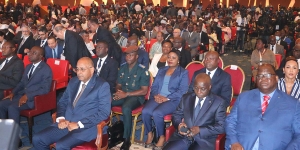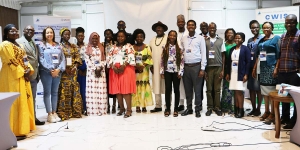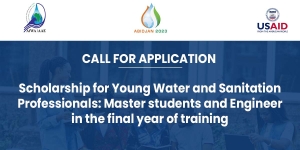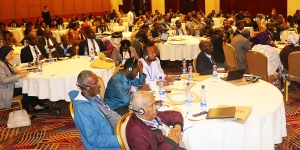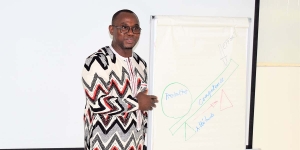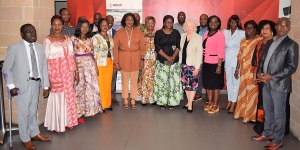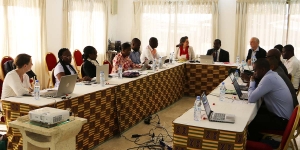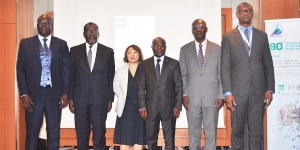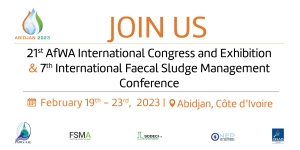Nzickonan Stéphanie
21st AfWA Congress and 7th WSF: Prime Minister of Côte d'Ivoire, chaired the opening ceremony
More than 3000 delegates from all over the world are gathered in Abidjan, the administrative capital of Côte d'Ivoire, from February 19th to 23rd, for the 21st AfWA International Congress and Exhibition and the 7th Conference on Faecal Sludge Management of the Faecal Sludge Management Alliance. The opening ceremony of this international event took place this Monday, February 20, 2023, in the presence of the Prime Minister of Côte d'Ivoire, His Excellency Patrick Achi.
Water and Sanitation: AfWA in strengthening the knowledge of African journalists in Abidjan
As a prelude to its 21st Congress and the 7th Conference on the management of faecal sludge, AfWA is organizing a capacity building workshop for journalists on February 17 and 18 in Abidjan.
A total of twenty media professionals from 20 English- and French-speaking African countries are participating in this capacity building workshop. The objective of this workshop is to bring media professionals to become familiar with water and sanitation issues and to accompany AfWA in the implementation of its activities.
The workshop which started on Friday was opened by Dr. Simeon Kenfack, AfWA's Director of Programs.
In his speech, he emphasized the importance of access to safe drinking water and sanitation for African populations. According to him, this access to water and sanitation contributes to the socio-economic development of our countries.
It is essential, he said, that journalists have the knowledge and skills to share accurate information on the importance of universal access to safe drinking water and adequate sanitation services.
We urge you," he told journalists, "to use your pens to be spokespersons and accompany AfWA in its advocacy, so that the issues of the sector are included in the agenda of African governments. It is necessary, he added, that men and women of the media work to give more visibility to AfWA and to strengthen its reputation.
The opening ceremony was followed by presentations on the theme of sanitation.
Thus, Dr. Mbaye, AfWA's Senior Sanitation Program Coordinator, and Valentin Yao, Sanitation Training Manager, presented the global and African sanitation situation, as well as AfWA's City-Wide Inclusive Sanitation (CWIS) program, its principles, steps, tools and implementation conditions.
In their presentation, they emphasized the links between water and sanitation. Most cities in African countries, they noted, face major sanitation problems. A situation that should be resolved as soon as possible, they recommended, calling on African countries to work to ensure that sanitation is given priority.
Governments, they said, "could create an enabling environment to ensure that water and sanitation services are properly provided.
It should be recalled that this meeting of journalists members of the AfWA network, will continue with the media coverage of AfWA Congress activities from February 19 to 23.
AfWA is awarding research scholarships to African Young Water and Sanitation Professionals
As part of its Capacity-Building Program for African stakeholders in the water, sanitation, and hygiene sector (AfriCap) funded by USAID, the African Water Association is awarding research scholarships to African Young Water and Sanitation Professionals. Target beneficiaries are master students and engineer in the final year of their training. Each scholarship, with a maximum value of USD1,000 (one thousand US dollars), will make it possible to carry out a research work sanctioned by a scientific report on a theme related to the WASH sector.
During the 2016-2017, 2017-2018, and 2018-2019 academic years, AfWA awarded sixty (60) scholarships to students from eleven (11) countries in West and Central Africa. Other scholarships will be awarded across Africa for a period of three years (2021-2024). For the 2021-2022 academic year, fifteen (15) scholarships have been awarded to students from 13 countries. For the academic year 2022-2023, other fifteen (15) scholarships will be awarded across Africa.
Application process
Candidates for the scholarship program will formulate their research topics in relation to one of the themes proposed in this call for applications. They will also be able to apply to one of the research topics proposed by one of the members of AfWA. Topics will be available on AfWA website. To apply, applicants must fulfill the following requirements:
- Be a citizen of a sub-Saharan African country eligible for USAID funding.
- be in good standing academically with respect to their institution.
- Submit an application file including:
- Student card or registration receipt for the current year
- Last completed degree
- Curriculum vitae (3 pages max)
- Three recommendation letters (one should be from the academic supervisor)
- Research proposal form to be downloaded Click to download the project proposal
Submission
Applicants must submit their application electronically at the following addresses simultaneously: This email address is being protected from spambots. You need JavaScript enabled to view it.This email address is being protected from spambots. You need JavaScript enabled to view it.This email address is being protected from spambots. You need JavaScript enabled to view it. and This email address is being protected from spambots. You need JavaScript enabled to view it.This email address is being protected from spambots. You need JavaScript enabled to view it.This email address is being protected from spambots. You need JavaScript enabled to view it.. For any request or clarification, please send an email to This email address is being protected from spambots. You need JavaScript enabled to view it..
The list of successful candidates will be published on AfWA website: www.This email address is being protected from spambots. You need JavaScript enabled to view it..org and each beneficiary will receive an official notification from AfWA.
Submission deadline
Students wishing to participate in the program are requested to submit their full application by April 15, 2023. The list of recipients for the 2022-2023 academic year shall be published by June 15, 2023.
Research themes
The following themes were selected for this scholarship program for the 2022-2023 academic year:
- Approaches to reducing Non-Revenue Water in water utilities
- Improved Water Quality Control
- Water services in low-income urban areas
- Improvement of urban and peri-urban sanitation
- ICT use (Digitalization) in water and sanitation services
- Water resources management
- Water, sanitation, and gender.
Financial aspect
As part of this scholarship, the maximum amount allocated per recipient is US $ 1,000. Sixty percent (60%) of this amount will be paid to the recipient once the detailed plan of the research project is finalized, approved by the research supervisor, and received by AfWA Research and Capacity Building Program Coordinator. The remaining forty percent (40%) shall be paid once the recipient submits the electronic version of their final research report.
Reporting conditions
Students receiving the AfWA grant will be required to regularly prepare and submit a monthly report on the status of their work and a final report at the end of the project.
AfWA Joint General Assembly: AfWA re-defines membership categories and fee levels.
On Thursday, January 19, 2023, AfWA President Dr. Silver Mugisha convened a joint general meeting to submit for membership approval new AfWA membership categorizations and annual dues.
From now on, municipalities, academic institutions, regulators are integrated into regular members category. This category was initially composed of utilities dealing with production, distribution of water, as well as assets holding companies in the Water, Sanitation and Environment sector in Africa.
Non-governmental organizations, industries, various service providers, and technology consulting firms are also now included in the affiliated members category, initially composed of African or international water, sanitation, and environment companies such as professional associations, and excluding those included in the category of active members.
Finally, two distinct categories of individual members have been established, the students on one side and the university professionals, researchers as well as individual consultants in the other side.
It should be noted that AfWA members are classified into four (4) categories namely regular members, affiliate members, individual members, and honorary members. Honorary members are people who rendered distinguished services to the Association and contributed to building its international reputation.
The Criteria for the Honorary Members category has not been changed.
For the new fee structure, please click on the link: https://afwa-hq.org/index.php/en/component/jdownloads/send/257-new-fees/666-new-fees
USAID MuniWASH: Sanitation MSMEs innovate business techniques to increase sales
The private sector in Côte d’Ivoire is playing a pioneering role in offering high-quality and affordable sanitation products and services to meet the needs of customers in the local sanitation market. However, scaling sales of sanitation products and creating a sustainable market still remains a significant challenge. To support the market and improve the operational reliability of providers and suppliers of sanitation services and products, the USAID MuniWASH Activity (MuniWASH) trained a dozen sanitation Micro, Small, and Medium Enterprises (MSMEs) in Abidjan on an innovative business approach called RACE (Result = Attitude + Competence + Effort). This approach is based on the concept that positive outcomes result from a combination of the right attitude, competence, and effort. MuniWASH organized this training from September 30 to October 1, 2022, for MSMEs and MuniWASH’ s field monitoring assistants. Field monitoring assistants will play the crucial role of providing coaching, field supervision to MSMEs and data collection.
Through this training, MuniWASH is building the capacity of business managers by providing them with a unique selling technique they can utilize to more easily persuade customers to buy their products and services. The entrepreneurs who participated in the training learned that the purpose of sales conversations is not merely to convince customers to buy, but rather to increase customers’ knowledge about the decision to buy.
According to RACE, there are three essential steps for increased sales results — attitude, competence, and effort. First, the MSME should identify the household's sanitation problems and estimate the medium to long term cost/deterioration of the household sanitation situation should the problems remain unresolved. Second, the MSME should present a detailed solution to the household. Finally, the MSME should emphasize the value of the solution, including the price and cost benefit.
"This commercial approach touches the sensitivity of the client household" testified Mr. Ossoro, head of a sanitation company in Gagnoa. "Today, my vision of things has changed in terms of prospecting. By following this method, I will be better at convincing my customers," he said.
Through role-playing and practical sales conversation exercises, all training-participants successfully performed sales methods by following the three essential steps. MuniWASH will continue coaching the MSMEs through its s field monitoring assistants to help the business owners recruit, train, and employ their own sales agents to create customer demand. The president of the on-site sanitation professional association, Réseau des Entrepreneurs en Assainissement Autonome de la Côte d'Ivoire (REAACI), aims to disseminate this practice to all its members. "We need to be able to pass on these very rewarding techniques to other members who have not participated," said Alpha Baldé.
At the end of the training, the participants felt they had a good understanding of sales skills and methods. This innovative approach should allow them to increase their sales substantially – by about50 percent or more.
Grants 2024
Abidjan, Côte d’Ivoire: The USAID MuniWASH Activity and the Directorate in charge of Decentralization and Local Development train municipal actors in gender promotion
On October 27, the USAID West Africa Municipal Water, Sanitation, and Hygiene (MuniWASH) Activity and the Direction Générale de la Décentralisation et du Développement Local (DGDDL) organized a capacity building workshop on fundamental gender concepts, which was attended by USAID/Côte d'Ivoire Acting Country Representative, Ms. Candace Buzzard.
Supported by the Gender and Equity Directorate of the Ministry of Women's Affairs, the workshop trained approximately 20 participants, including nine women, who wanted to better understand the role gender plays in the local development context. These participants included local elected officials and heads of municipal services from the eight targeted municipalities of USAID’s MuniWASH Activity in Côte d'Ivoire.
During the workshop, participants learned about definitions of gender, stereotypes, biases, and the roles society ascribes to men and women in family, community, and professional settings. According to Yaya Sanogo, a local elected official of the Municipality of Abobo, "Analyzing the daily work of women allowed me to understand that they are the ones who get up early, go to bed the latest and work much more than men.” That is why one of the facilitators, Ms. Leticia Ackun, Gender Specialist at the African Water Association, encouraged the participants to “better consider the practical needs and strategic interests of men and women in the implementation of community based projects.”
The participants of the training are now appointed as gender focal points within their respective municipalities and will be in charge of promoting gender at the local level under the coordination of the DGDDL gender unit. These focal points will therefore carry out awareness activities targeting the entire municipal council and advocate for deliberate consideration of gender in the organizational and operational management of the municipality.
Ms. Buzzard assured that USAID will continue to “support national institutions in the fight against gender inequalities, especially in the WASH sector.” The USAID MuniWASH Activity, in collaboration with the DGDDL, will increase non-formal learning opportunities for participants by regularly providing them with gender mainstreaming resources to help them carry out their work at the local level. These could include the national gender promotion strategy, the new law on marriage in Côte d'Ivoire and laws against gender-based violence.
MuniWASH is implemented by Tetra Tech in Benin and Côte d'Ivoire in close collaboration with the African Water Association.
German-African Partnership: GAPWAS Phase II planning workshop held in Abidjan
After the success achieved in phase 1 of the GAPWAS (German-African Partnership in Water and Sanitation) program, implemented by German Water Partnership (GWP) within AfWA, the Federal Ministry for Economic Affairs, Cooperation and Development (BMZ) of Germany approved a second phase of the program covering the period 2023-2025.
The objective of the project is to strengthen the institutional framework of water and sanitation in Africa so that better water and sanitation services are provided to the African population.
The planning workshop for this new investment was held from December 13 to 15, 2022 in Abidjan and brought together key AfWA staff led by the Executive Director, Mr. Sylvain USHER. This workshop was intended as a framework to review the progress of the first phase and to define the priorities and activities planned for the second phase.
At the opening of the workshop, Mr. Sylvain Usher thanked the project team for the good collaboration during the first phase and wished that it would be the same during the second phase. He also expressed his satisfaction with the project's positive impact on the Association and invited his collaborators to get involved in the implementation of Phase II.
For her part, Marie-Louise Chagnaud, GAPWAS project coordinator, congratulated AfWA for obtaining the funding renewal and advocated for collaborative work to ensure success.
It should be noted the German-African Partnership for Water and Sanitation is a cooperation project between the African Water Association (AfWA) and the German Water Partnership (GWP), financed by the German Federal Ministry for Economic Cooperation and Development (BMZ) and supported by sequa gGmbH.
The 90th meeting of the Scientific and Technical Council of AfWA, started this Monday, November 21, 2022 in Abidjan, Côte d'Ivoire
Under the aegis of the Société de Distribution d’Eau de Côte d’Ivoire, the Water Utility of Côte d'Ivoire (SODECI), the 90th meeting of the Scientific and Technical Council of AfWA, started this Monday, November 21, 2022 in Abidjan, Côte d'Ivoire, on the theme: ''Innovative systems, approaches and tools to accelerate access to sustainable water and sanitation services for all''.
During the opening ceremony presided over by the Ivorian Minister of Water, Sanitation and Hygiene, Mr. Bouaké Fofana, the Managing Director of SODECI, Mr. Ahmadou Bakayoko, expressed his delight at the trust placed in Côte d'Ivoire to hold the meeting. He said that "the challenges to meet in order to promote access to drinking water and sanitation services to all are overriding but not insurmountable". That is why he thanked the delegates for their massive presence, a sign of their faith in the importance of consultation and knowledge sharing to identify and implement appropriate solutions to get the continent out of its difficulties.
Dr. Papa Samba Diop, President of the Scientific and Technical Council, said that "water and sanitation issues have long remained one of the most difficult equations to solve in Africa. This should no longer be the case, now that we have quality human resources to transcend them''. He also emphasized the importance of innovation and tailor-made responses adapted to each local problem, pragmatic and agile responses, relying on local partnerships.
Mr. Sylvain Usher, Executive Director of AfWA, pointed to endogenous and exogenous factors as the cause of Africa's delay in achieving the SDGs. He cited, among other factors, the poor control over the reduction of Non-Revenue Water by water utilities, the poor control over sanitation management, the impacts of climate change. Then, referring to the COP 27 which has just ended in Egypt and which AfWA attended, he added: "it is high time for the African Water Association through its Scientific and Technical Council to get involved in the COP process to present its specific challenges to the sector, so that together with all the other experts from all sides, we can hope for solutions to our problems.
For Minister Bouaké Fofana, the situation of water and sanitation in Africa is at the heart of African leaders’ concerns. Crisis situations, natural disasters, conflicts in Africa require that the international community and particularly African experts meet to assess the nature of the relief and coordinate its implementation for the welfare of African populations,'' which calls for self-sufficiency in drinking water and sanitation security. Speaking about the water sector in Côte d'Ivoire, the Minister said that several actions have been undertaken to mobilize water resources for the development of the water and sanitation sector. In addition, discussions are being held to implement a better governance of water and sanitation. A rational management of resources and means will allow the achievement of the commitments related to SDG 6. The Minister concluded his speech by inviting SODECI to spearhead innovative initiatives for which Côte d'Ivoire will be able to put forward its leadership to advance the issue of water and sanitation on the continent.
It should be noted that about 200 delegates from 17 African and European countries are taking part in this meeting in Abidjan from November 21 to 24, 2022.
21st AfWA International Congress and Exhibition and 7th FSMA Conference: Registration is now open
The 21st Congress will be held from February 19 to 23, 2023 in Abidjan, in the Republic of Côte d'Ivoire on the theme: "Acting for the sustainable management of resources and access to water and sanitation for all".
More than 2,000 participants are expected from all continents, and more than 100 exhibitors on the technologies and management approaches of the sector. This is all the more possible as the AfWA congress will be organized jointly with the 7th International Faecal Sludge Management Conference (FSM7). Every two years, the African Water Association organizes an international congress, which brings together all of its members, international organizations, experts, political decision-makers, and development partners in order to take stock of the latest developments of the water, sanitation and environment sector in Africa. The African Water Association Congress is a scientific and technical forum coupled with a major international exhibition, which includes technical sessions, workshops, parallel events, "B-to-B" meetings, and "one -to-one”.
Over the past 10 years, the event has recorded a record number of participants: 1,600 delegates in 2010 in Kampala, 900 in 2012 in Marrakech, 2,000 in 2014 in Abidjan, 1,500 in 2016 in Nairobi, 1,200 in 2018 in Bamako and 2500 in 2020 in Kampala.
The FSM Conference is held biennially and alternates between Africa and Asia. The previous edition, FSM6, was held virtually due to the global pandemic.
Registration is now open. ➡️ www.abidjan2023.com

 English
English  Français
Français 
